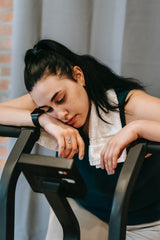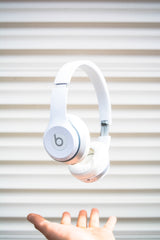Why Does My Head Sweat So Much When I Exercise?

Sweating during exercise might be annoying but it’s completely normal. This vital bodily function helps to protect us from overheating and dying during our workout. Without it, we’d be in big trouble. The average person has between two and four million sweat glands and a large number of these are found on the face and head. During exercise, you may notice an increase of moisture in these areas.
Asking questions like why does my head sweat so much when I exercise? Suggests that you may already believe that the amount you sweat is irregular and that you have a problem.
Certainly, there will be times where we’ve all felt that the amount we’re sweating is disproportionate to the amount of physical activity that we’re doing. We’re often not the best people to judge what’s normal and what’s not when it comes to our own bodies. People rarely sweat as they do in TV dramas or films. Don’t believe everything you see in fitness magazines or on Instagram feeds either. The volume at which we sweat during exercise might not reflect how hard we’re working out in comparison to others, either. There are a number of factors that contribute to the amount that we sweat and most of them aren’t anything to be worried about.
Why Does My Head Sweat So Much When I Exercise?
- People who are heavier tend to sweat more than those with smaller builds. Men tend to sweat more from the head than women do.
- The fitter you are then the more likely it is you’ll perspire in greater amounts.
- Exercising in humidity makes it harder for the moisture to evaporate off the skin making you feel sweatier.
- Excessive sweating can be genetic — thank your parents for that one.
- It could also be a sign of hyperhidrosis which can be a condition in its own right or the symptom of an underlying health complaint.
Why Do We Sweat When We Exercise?
Our bodies are designed to maintain a temperature of around 98.6 degrees. During exercise, we start heating up and our core is then at risk of exceeding its optimum temperature. As we start getting warmer, the brain triggers a signal that tells the glands in our skin to start releasing moisture. This sweat is then evaporated off the surface of our body and into the air keeping us cool. This is called thermoregulation and it’s vital to our wellbeing. Of course, we don’t just sweat for temperature control during a workout. As an article published on Greatist explains, an increase in blood pressure and heart rate caused by exertion will also make us sweaty.
It’s important to remember that sweating doesn’t mean that you’re working out harder than someone else nor does it mean that you’re unfit. There are a number of underlying factors to explain why one person sweats more than another even when those people are of the same gender or if they’re working out at a similar intensity and in the same environment.

Why Do I Sweat More Than I Used To?
It might be that you’re fitter now than you used to be.
Surprisingly, those with higher fitness levels tend to sweat sooner and more intensively than those who aren’t so fit. Physical therapist and strength trainer William P. Kelley told Huff Post that people with higher fitness levels have a quicker response when it comes to cooling the body’s core temperature. This allows an individual to workout harder for longer. Sweating could just be a pay-off for all the extra hard work you’ve been putting in to stay active — congrats! And let’s face it, if you’re going to put up with being a bit sweatier during a workout then it might as well be because you’re absolutely smashing your PB.
Of course, excessive sweating isn’t always caused by exercise. If you’re taking prescription medication, then sometimes a side-effect can be sweating more profusely.
Don’t underestimate humidity either. Our bodies can’t cool down efficiently if the air is already filled with moisture. This makes it harder for thermoregulation to take place. The sweat will stick around on our skin for longer making us feel uncomfortable and — for lack of a better description — very sweaty.
You might have a condition called hyperhidrosis which is categorised as ‘excessive sweating’. If you do have this, then it’s likely that you’re already experiencing an increase in perspiration in other areas of your life and not only in the gym. Keep reading as we’ll include a section on hyperhidrosis at the bottom of this post.
How Can I Stop My Head Sweating So Much When I Exercise?
Washing your face and head regularly will help reduce a build up of oil and grease.
The temptation might be to wear a hat or wrap but this could be making you sweat more. If you do have something around your head, then opt for a sports headband or something that can wick moisture away from your head faster.
Caffeine and spicy food can also make a person sweat more. Try avoiding these trigger foods and see if it makes any difference to the amount that you’re sweating.
Check the weather. If there’s going to be high humidity, then it might be a good time to take your workout indoors.
What is Craniofacial Hyperhidrosis?
At least 1% of people in the UK suffer from excessive sweating, also known as craniofacial hyperhidrosis. If you recognise the following conditions, then you could have hyperhidrosis, too.
- Sweat from particular parts of the body on both sides
- Sweat at least once a week
- Began sweating as a child or during adolescence
- Find sweating impairs your daily activities
-
Don’t sweat at night
^ Taken from the Hyperhidrosis UK website.
There’s no cure but there are things you can do to alleviate symptoms and manage the condition. This can include tablets, special soaps, botox, operations and small changes to your lifestyle.
It’s completely normal to sweat during exercise but if you think that you’re sweating excessively or if it’s beginning to affect your life then talk to your GP about what could be causing it and how to treat it.
Excessive sweating isn’t just something that can ruin your confidence in the gym. It can wreck headphones, too. EarHugz are sweat-proof headphone covers that wick moisture away from the cushions. They come in a range of awesome designs and are all fully reversible to black.





